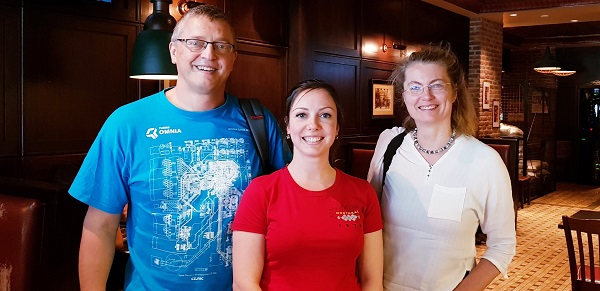By Alexandrine Gauvin, CENTR Communications Manager – “We reject kings, presidents and voting. We believe in rough consensus and running code.” [RFC 7282] Welcome to the Internet Engineering Task Force!

For the first time since I started working in the domain name industry more than three years ago, I had the opportunity to attend an IETF meeting. I quickly realised I wasn’t quite a newcomer: more like an observer. Or, to be brutally honest and taking into consideration my (very) limited technical knowledge, closer to a curious alien on site. All I knew was based on the IETF reports (filter by “IETF”) we publish at CENTR, thanks to the reporting skills of Monika Ermert (who I was glad to meet in person for the first time this week, with our fantastic Co-Chair of the CENTR Technical WG, Ulrich Wisser). I was also quite excited at the idea of witnessing some live decision-making humming. But beyond that, I was mostly hoping to get a sense of wonder being surrounded by more than a thousand of the sharpest minds in the world, who are literally building the network’s standards so that mere users like myself can enjoy the beauty of the internet every single day.
IETF: what does it eat in winter?
This is a literal translation of a Québécois saying (“qu’est-ce que ça mange en hiver?”) that means: what is this, what does it do, how does it work, etc. For my part, the most revealing session of the meeting was obviously the newcomers’ tutorial, which was held on Sunday. The key to understanding the IETF, I believe, is that it’s a standards development organisation. Its mission is to “make the Internet work better by producing high quality, relevant technical documents that influence the way people design, use, and manage the Internet.” [RFC 3935]
However, it’s important to highlight that those standards are not mandatory: they are developed within the IETF community and structure, agreed-upon through a unique rough consensus (no voting) process and that the adoption of those standards are market-based.
What struck me is that the IETF is a hard-working community: the constant goal of participants is to come up with solutions to issues, either informally at first (for example, through Birds of a Feather [BoFs] sessions) or more formally through drafts that may become Requests for Comments (RFCs) developed within Working Groups (WGs). It’s a very real example of the expression “work hard, play hard”, since participants also know how to enjoy themselves. Social events at meetings are popular and well-attended, and often an extra opportunity to argue (respectfully) with peers on certain topics.
IETF culture
The IETF’s tutorial also included a nice overview of the IETF culture, which in my view, says a lot about the great gathering of participants and the spirit of IETF meetings. They highlighted that many participants are quite passionate, smart and vocal people that may come across as rude when they’re expressing themselves, although always with the most constructive and respectful intentions. Technical excellence is certainly highly valued. We were informed that the dress code is informal (long live t-shirts!) and were recommended not to feel intimidated by the feeling that “everyone already knows each other”: participants develop close bonds through years, but it doesn’t mean they’re exclusive. Quite on the contrary: WG Chairs and senior participants are pretty involved in the newcomers’ programme through meet & greets, mentoring, newcomers’ reception, etc.
I was personally quite entertained by a long string of conversation on the IETF102 attendees’ mailing list on the best SIM card options on site. The tutorial presenters even confirmed it was a hot topic at each meeting, in addition to quests to find social event tickets. But nobody should be fooled by the mundane email exchanges on that list: meanwhile, there is serious work going on in about 130 active WGs. The quantity and the quality of interventions in each of the IETF’s seven areas is quite impressive.
One-day pass: hanging out at DNSOP and DPRIVE
As a (non-technical) outsider, I paid more attention to processes than the actual content. I finally witnessed some of the humming in one of the sessions, but wasn’t quick enough to record it. I also witnessed some of the “rude” interventions we were warned about at the newcomers’ session: they were not kidding! There were some brutal replies during WG discussions. It made me wonder if this could have an impact on newcomer participation, in addition to the pretty steep attendance fees (700-800$USD for full-meeting passes).
The composition of attendees is also interesting: it’s mostly various tech industry reps and academia. However, one could wonder how fair and open the IETF is in practice when Google can afford to send up to 60 people to participate in various key WG activities. The IETF organisation never pretended to be neutral, and for standards to be more widely adopted, it is important to have major tech companies in the room, but it is an interesting fact, considering this group’s goal is to “make the internet work better” (…but for whom?).
Fierce, smart and committed
Nevertheless, it is obvious that the IETF community is a gathering of smart and dedicated individuals that truly believe in the ideal of improving the network for the benefit of all stakeholders, including (and probably most importantly) end-users. It was an impressive sight, even though I felt a bit like a fish out of water. I believe it will be particularly interesting to see how this community evolves over time (although no major changes seem to be expected, since meeting dates are already on the agendas until 2028!). I hope most attendees got to enjoy my hometown of Montréal as well. Long live techies!


